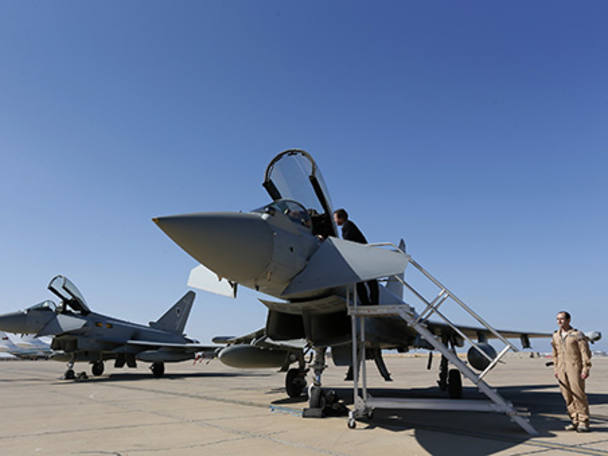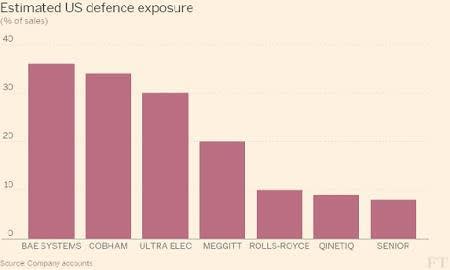This will be the first year in many when defence exposure takes priority over aerospace. Frequent Islamic State-inspired terror threats and cyber attacks in the corporate world have seen to that, transforming defence budgets from one of the hardest hit areas of public spending - both at home and abroad - into a ringfenced priority.
Having previously committed to spending 2 per cent of gross domestic product on defence through to 2020, the government's much anticipated defence and security review saw the Conservative government promise to put £12bn more into military operations over the next decade than was previously planned. A slew of tragic events leading up to this announcement, including devastating attacks on Paris, clearly played a decisive role in influencing parliament to put an end to years of cutbacks.
Key measures included doubling the number of RAF drones - used to bomb Islamic militants in recent months - and pouring an extra £1.9bn into cyber security. Two new strike brigades were also commissioned, together with a major investment to transform the nation's core submarine base in Scotland into a "world-leading" facility.
Europe's largest defence contractor, BAE Systems (BA.), led the list of beneficiaries, alongside technology giant QinetiQ (QQ.). The Ministry of Defence remains QinetiQ's biggest customer, hence why shares in the Farnborough-based company rocketed once news spread that the more defence-friendly Tory party had been given a majority in May. Cobham (COB) and Ultra Electronics (ULE) also depend on the UK for at least one-tenth of sales, while all of the aforementioned and Rolls-Royce (RR.) are involved in the £31bn project to renew Trident.
But, despite representing an obvious boon for several names, on a global scale the UK is not the fighting machine it used to be. That status as the world's largest spender on military goods instead belongs to the US. Interestingly, politicians there are similarly on the brink of relaxing austerity shackles following years of savage cutbacks.
The US Department of Defense's latest two-year budget deal was recently given the green light by the Senate and House of Representatives, bringing the Pentagon's kitty up to $607bn (£403bn) in 2016 and $610bn in 2017. Aside from rising geopolitical tensions, an improving economy was equally a big driver behind putting an end to years of budget caps. Those most likely to prosper from a more robust US defence environment are BAE, Cobham and Ultra Electronics.
Aerospace shares encounter turbulence
Prospects for civil aerospace operations, on the other hand, aren't quite so convincing. True, the world's population is travelling more, hence why Airbus (Fr:AIR) and Boeing (US:BA) boast a huge order book of aircraft. But for all the talk that consumer cycle shares will dominate in 2016, news that Boeing's orders fell by nearly half in 2015 provides a useful reminder of the growing challenges the sector is facing.
After years of swelling order backlogs, it would appear that airlines are now starting to keep their wallets closed. To emphasise the impact this scenario may have, analysts at Deutsche Bank reckon falling book-to-bill ratios (orders received to orders billed) will spur a 10-15 per cent sector-wide derating. Judging by recent share price movements of top aerospace names Cobham, Senior (SNR), Meggitt (MGGT) and Rolls-Royce, investors, too, are sceptical.
What's particularly concerning is dwindling demand for after-market work, an issue that prompted Meggitt to issue a profit warning last October. Because they're relatively scarce, margins on parts for older planes are often much fatter. But with airlines now taking older, less environmentally friendly planes out of service, this gravy train has started to dry up.
Other issues plaguing the sector are weakness in emerging market currencies and cheap energy prices. The former has challenged the ability of some major airline customers to continue their fleet expansion plans, while the latter has had a similar effect - despite many in the industry assuming otherwise.
| Price (p) | Market cap (£m) | PE (x) | DY (%) | 1-year change (%) | Last IC view | |
|---|---|---|---|---|---|---|
| BAE SYSTEMS | 506 | 16,020 | 13.5 | 4.1 | 3.5 | Buy, 488p, 07 Jan 2016 |
| COBHAM | 260 | 2,957 | 13.6 | 4.1 | -20.1 | Buy, 287p, 13 Aug 2015 |
| MEGGITT | 356 | 2,759 | 10.6 | 4.0 | -30.6 | Hold, 360p, 27 Jan 2016 |
| QINETIQ GROUP | 245 | 1,440 | 15.1 | 2.2 | 32.4 | Hold, 255p, 19 Nov 2015 |
| ROLLS-ROYCE HOLDINGS | 550 | 10,113 | 9.6 | 0.0 | -35.0 | Sell, 552p, 15 Dec 2015 |
| SENIOR | 212 | 889 | 10.6 | 2.7 | -31.4 | Buy, 273p, 28 Jul 2015 |
| ULTRA ELECTRONICS HDG. | 1,857 | 1,305 | 15.5 | 2.4 | 2.8 | Buy, 1,770p, 06 Aug 2015 |
Favourites
With security tensions sharply escalating and BAE's major customers quick to respond, we reckon the group and its shares have turned a corner. As noted above, Europe's biggest defence contractor emerged as one of the biggest beneficiaries of recent upticks in military spending at home and abroad. Brighter prospects should eventually help to better cover the attractive dividend yield, close the substantial valuation gap against global peers and ease concerns over the debt pile.
Outsiders
British champion Rolls-Royce (RR.) is a shadow of its former self. The engineer recently issued its fifth profit warning in under two years, thanks to a low oil price eroding the spending power of submarine customers and weak appetite for aircraft parts throwing its once solid aerospace operations into disarray. Since then, big name fund managers such as Neil Woodford have dumped the shares, while the government has been mulling over nationalising the group's stricken submarine unit. Boss Warren East responded by unveiling a "major restructuring" programme designed to reignite confidence and save up to £200m a year. But a much-needed clean-up won't be achieved overnight.










